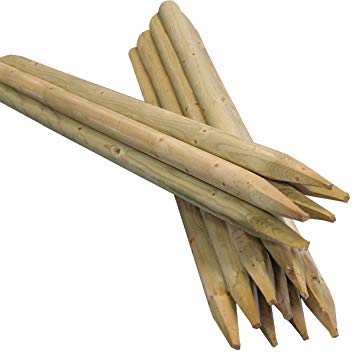
stake 2[steyk] SynonymsWord Origin noun
- something that is wagered in a game, race, or contest.
- a monetary or commercial interest, investment, share, or involvement in something, as in hope of gain: I have a big stake in the success of the firm.
- a personal or emotional concern, interest, involvement, or share: Parents have a big stake in their children’s happiness.
- the funds with which a gambler operates.
- Often stakes. a prize, reward, increase in status, etc., in or as if in a contest.
- stakes. Poker. the cash values assigned to the various colored chips, various bets, and raises: Our stakes are 5, 10, and 25 cents: you can bet out 10 cents on a pair and reraise twice at 25 cents.
- a grubstake.
verb (used with object), staked, stak·ing.
- to risk (something), as upon the result of a game or the occurrence or outcome of any uncertain event, venture, etc.: He staked his reputation on the success of the invention.
- to furnish (someone) with necessaries or resources, especially money: They staked me to a good meal and a train ticket.
Idioms
- at stake, in danger of being lost, as something that has been wagered; critically involved.
Origin of stake 2First recorded in 1520–30; origin uncertainSynonyms for stake 1. wager, bet. 5. winnings, purse. 8. bet, gamble, hazard; jeopardize. British Dictionary definitions for at stake stake 1 noun
- a stick or metal bar driven into the ground as a marker, part of a fence, support for a plant, etc
- one of a number of vertical posts that fit into sockets around a flat truck or railway wagon to hold the load in place
- a method or the practice of executing a person by binding him to a stake in the centre of a pile of wood that is then set on fire
- Mormon Church an administrative district consisting of a group of wards under the jurisdiction of a president
- pull up stakes to leave one’s home or temporary resting place and move on
verb (tr)
- to tie, fasten, or tether with or to a stake
- (often foll by out or off) to fence or surround with stakes
- (often foll by out) to lay (a claim) to land, rights, etc
- to support with a stake
Word Origin for stake Old English staca pin; related to Old Frisian staka, Old High German stehho, Old Norse stjaki; see stick 1 stake 2 noun
- the money or valuables that a player must hazard in order to buy into a gambling game or make a bet
- an interest, often financial, held in somethinga stake in the company’s future
- (often plural) the money that a player has available for gambling
- (often plural) a prize in a race, etc, esp one made up of contributions from contestants or owners
- (plural) horse racing a race in which all owners of competing horses contribute to the prize money
- US and Canadian informal short for grubstake (def. 1)
- at stake at risktwo lives are at stake
- raise the stakes
- to increase the amount of money or valuables hazarded in a gambling game
- to increase the costs, risks, or considerations involved in taking an action or reaching a conclusionthe Libyan allegations raised the stakes in the propaganda war between Libya and the United States
verb (tr)
- to hazard (money, etc) on a result
- to invest in or support by supplying with money, etcto stake a business enterprise
Word Origin for stake C16: of uncertain origin Word Origin and History for at stake stake n.1
“pointed stick or post,” Old English staca, from Proto-Germanic *stakon (cf. Old Norse stiaki, Dutch staak, German stake), from PIE root *steg- “pole, stick.” The Germanic word has been borrowed in Spanish (estaca), Old French (estaque), and Italian stacca) and was borrowed back as attach. Meaning “post upon which persons were bound for death by burning” is recorded from c.1200. Stake-body as a type of truck is attested from 1907. In pull up stakes, “The allusion is to pulling up the stakes of a tent” [Bartlett].
stake v.
early 14c., “to mark (land) with stakes,” from stake (n.1). Hence, to stake a claim (1857). Meaning “to risk, wager” is attested from 1520s, probably from notion of “post on which a gambling wager was placed,” though Weekley suggests “there is a tinge of the burning or baiting metaphor” in this usage. Meaning “to maintain surveilance” (usually stake out) is first recorded 1942, American English colloquial, probably form earlier sense of “mark off territory.” Related: Staked; staking.
stake n.2
“that which is placed at hazard,” 1530s, from stake (v.). Plural stakes, as in horse racing, first recorded 1690s (cf. sweepstakes). To have a stake in is recorded from 1784.
Idioms and Phrases with at stake at stake
At risk to be won or lost, as in We have a great deal at stake in this transaction. This phrase uses stake in the sense of something that is wagered. Shakespeare used it in Troilus and Cressida (3:3): “I see my reputation is at stake.” [Late 1500s]
stake
In addition to the idioms beginning with stake
also see:
 Liberal Dictionary English Dictionary
Liberal Dictionary English Dictionary